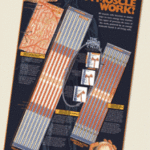PLOS Biology
Confronting climate change in the age of denial
Conservation stories from the front lines
PLOS Biology Explores Gaps between Environmental Health Science and Policy: Regulating toxic chemicals for public and environmental health
Wreaking Havoc One Chemical at a Time
PLOS Biologue
Should Chimpanzees Have Moral Standing? An interview with Frans de Waal
Could Vaccines Breed Super-Virulent Malaria? New research from Andrew Read’s group shows that vaccines can drive the evolution of more virulent pathogens.
East Bay Express
Pesticide Emasculates Animals New review confirms atrazine’s ability to wreak havoc on the male reproductive system
San Francisco Chronicle
We need to uproot fear of immunizations, on vaccines and autism, co-written with medical anthropologist Sharon R. Kaufman
National Geographic’s News Watch
Researchers battle time–and local resistance–to save France’s endangered brown bears
News Briefs in PLOS Biology
Ecology, evolution, wildlife, and environment
Dogs teach researchers new tricks about the genetics of complex traits
Wild gorillas handy with a stick
A human taste for rarity spells disaster for endangered species
Metabolism predicts ecological response
In the shadows of the Congo Basin Forest, elephants fall prey to the illegal ivory trade
Predicting species abundance in the face of habitat loss
Diverse pollination networks key to ecosystem sustainability
Switching drugs for livestock may help save critically endangered vultures
Can a taste for poison drive speciation?
Islands spareight: light; font-size: 14px;”>Plants tell caterpillars when it’s safe to forage
An evolutionary view of tiger conservation
Microbiology, cell and molecular biology, molecular evolution
Cultivating bacteria’s taste for toxic waste
Thriving community of pathogenic plant viruses found in the human gut
A new role for a long-studied DNA-wrangling enzyme
Clear evidence for two rounds of vertebrate genome duplication
When less is more: losing genes on the path to becoming human
Virus proteins prevent cell suicide long enough to establish latent infection
Comparing gene trees and genome trees: a cobweb of life?
A global view of DNA-packing proteins cracks the histone code
Untapped bounty: sampling the seas to survey microbial biodiversity
Antisocial behavior in cooperative bacteria (or, why can’t bacteria just get along?)
Neuroscience
Avoiding punishment is its own reward
Complex cells in the brain’s vision center tune in to natural scenes
Neural basis of body image: how to lose inches at the (perceived) flick of the wrist
Self-generated touch: a neural perspective
A new model of short-term model of motor adaptation
A molecular link between albinism and visual deficits
Exploratorium Museum Writing
Exhibits
Traits of Life lead writer for a new collection of life sciences exhibits exploring the unifying elements of living things
Women’s Health Hall of Fame, lead writer for a special exhibit highlighting exceptional leaders in women’s health, in conjunction with the exhibition, The Changing Face of Women’s Health, the first major exhibition to focus exclusively on women’s health.
Accidental Scientist, contributor on a website that explores how a pinch of curiosity can improve your cooking, through recipes, activities, and Webcasts designed to enhance public understanding of the science behind food and cooking.
Webcasts
Breast Cancer: What you should know, from prevention to mammography produced and hosted a show that explored limitations of mammography to detect breast cancer and the need to do more to prevent cancer
Interview with Carol Greider, recent recipient of the Nobel Prize in physiology or medicine, as part of Cold Spring Harbor’s celebration of the 50th anniversary of the discovery of DNA’s structure
Essays
Hunt for Neutrinos. How do you track a particle that leaves no trace?
Edwin Hubble: The Great Synthesizer. Revealing the breadth and birth of the universe
Painting by the Numbers. Scientists find beauty in the details of stars
Looking at the Sky through a Glass Ceiling. Women in astronomy
Dispatches
Welcome to Cold Spring Harbor
Evelyn Witkin Reflects on Cold Spring Harbor’s Golden Age
Evelyn Witkin Remembers Barbara McClintock
Book of Life or Signpost to a New Biology? Mapping the human genome brings surprises and new challenges
Fundamentalist Religions and Science: When science is seen as a subversive activity
 Lead writer for “How Does a Muscle Work?” poster developed as part of the Traits of Life exhibition. Won Honorable Mention in the 2007 Visualization Challenge, sponsored by NSF and Science magazine.
Lead writer for “How Does a Muscle Work?” poster developed as part of the Traits of Life exhibition. Won Honorable Mention in the 2007 Visualization Challenge, sponsored by NSF and Science magazine.